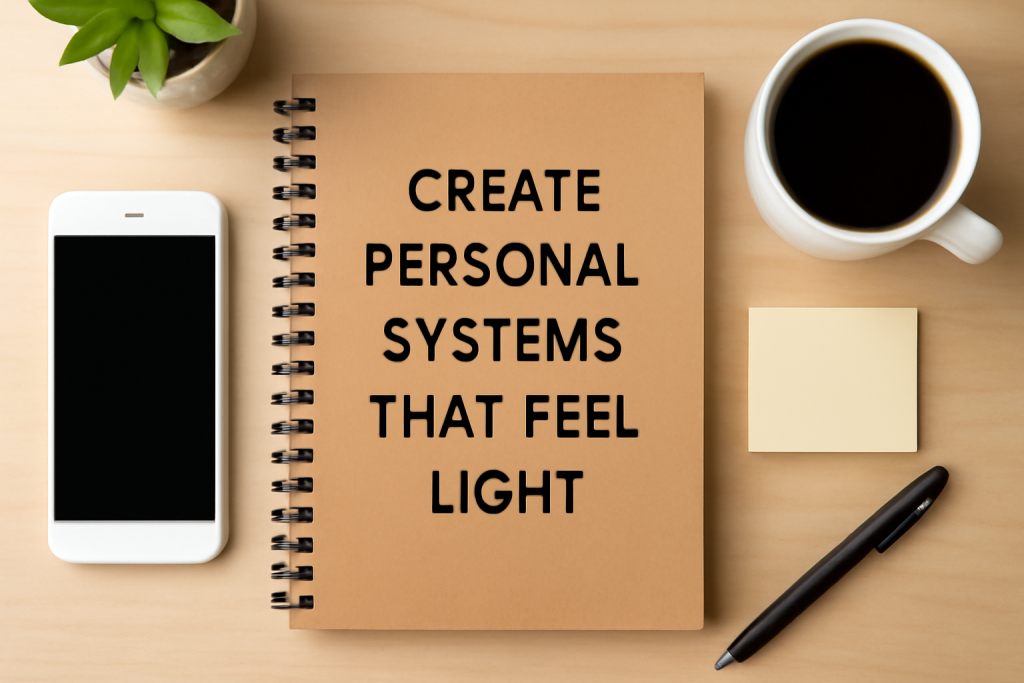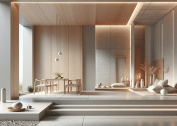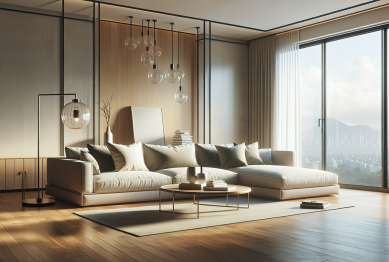In today’s fast-paced world, it’s easy to become overwhelmed with the demands of work, family, and personal life. The constant pressure to keep up with responsibilities, projects, and tasks can leave us feeling burdened, stressed, and bogged down. But what if there was a way to simplify things? What if you could create personal systems that make life easier without all the unnecessary weight?
In this article, we’ll explore how to create personal systems that feel light—systems that streamline your life and allow you to focus on what really matters, without feeling overwhelmed. We’ll dive into current trends in productivity, minimalism, and personal organization, providing actionable tips and strategies that can help you feel lighter, more organized, and in control of your life.

What Does It Mean to Create Personal Systems That Feel Light?
Before we dive into how to create personal systems that feel light, it’s important to understand what this means. Creating personal systems that feel light is about simplifying the way you handle your responsibilities, tasks, and goals. Instead of having a heavy, rigid structure that demands constant attention and upkeep, light personal systems are flexible, intuitive, and sustainable.
Personal systems that feel light are meant to remove friction from your life, allowing you to do the work that matters most while avoiding unnecessary complexity or burnout. These systems give you freedom, flexibility, and mental clarity.
Why Light Personal Systems Are Crucial in Today’s World
1. Overwhelm Is the Modern Epidemic
We live in a world where there’s no shortage of things to do, emails to respond to, social media to check, and tasks to complete. According to The American Psychological Association (APA), stress and overwhelm are at an all-time high, with a significant rise in work-related stress and anxiety. Many people find themselves in a constant cycle of multitasking, which is not only exhausting but also ineffective.
By creating personal systems that feel light, we can reduce this overwhelming pressure. A well-organized system helps you stay on top of things without feeling like you’re constantly playing catch-up. When systems feel light, they support you, not hinder you.
2. **Simplicity Boosts Productivity in Your Personal Systems
It might seem counterintuitive, but making things simpler can actually boost productivity. According to a study by The Productivity Project, overcomplicating processes or trying to manage multiple personal systems leads to burnout and decreases productivity. When we simplify, we create more room for creativity, focus, and energy.
In contrast, light personal systems streamline tasks, making them easier to manage. With fewer distractions and more clarity, you’ll find that you can get more done in less time. It’s all about working smarter, not harder.
How to Create Personal Systems That Feel Light
Now that we’ve covered why light personal systems are important, let’s explore how to create them. Here are some actionable steps to help you get started.
1. **Embrace Minimalism in Your Personal Systems
The first step in creating personal systems that feel light is adopting a minimalist approach. Minimalism isn’t just about decluttering your physical space—it’s about decluttering your mental and emotional space as well. Start by identifying what’s truly important to you and eliminating anything that doesn’t align with your goals.
Tip: Create a list of all your responsibilities and tasks. Ask yourself: What tasks can be simplified or eliminated? Focus only on the ones that bring you joy or move you closer to your personal or professional goals.
2. **Prioritize Flexibility in Your Personal Systems
A common mistake people make when creating personal systems is making them too rigid. Life is unpredictable, and systems that don’t allow room for flexibility are more likely to cause stress than relieve it. When designing a system, consider how it can be adjusted or changed based on your current needs.
Tip: Use digital tools, such as task management apps, that allow you to move tasks around or adjust priorities easily. Apps like Trello or Notion offer flexibility, allowing you to create dynamic systems that can adapt as your life changes.
3. **Automate Where You Can in Your Personal Systems
Automation is a powerful tool for creating personal systems that feel light. By automating repetitive tasks, you free up time and mental energy for more important activities. Whether it’s setting up automatic bill payments, using email filters to manage incoming messages, or scheduling social media posts in advance, automation can significantly reduce your workload.
Tip: Look for areas of your personal or professional life where automation can help. Set up recurring reminders, create automated workflows, or use tools like Zapier to connect various apps and automate tasks.
4. **Simplify Decision-Making in Your Personal Systems
One of the biggest reasons people feel weighed down is the constant decision-making. From what to eat for lunch to which task to prioritize, decision fatigue is real. Light personal systems can help reduce the number of decisions you have to make each day.
Tip: Implement routines or habits that eliminate the need to make decisions in certain areas of your life. For example, you could plan your meals for the week in advance, or use a morning routine to set the tone for the day without thinking about it.
5. **Declutter Your Space and Your Mind in Your Personal Systems
A cluttered environment leads to a cluttered mind. To create systems that feel light, start by decluttering both your physical space and your digital space. Remove items, tasks, or commitments that add unnecessary stress to your life. This will help you feel more in control and focused on what truly matters.
Tip: Set aside 15 minutes each day to declutter one small area—whether it’s your desk, your inbox, or your phone. Over time, these small actions will create a more organized environment that supports your goals.
The Psychological Impact of Light Personal Systems
In addition to the practical benefits of light personal systems, there’s a psychological benefit as well. When we have systems that feel light, we experience less stress and greater satisfaction. Psychologist Dr. Daniel Goleman states that creating a sense of order in our lives promotes a feeling of control, which in turn reduces anxiety and improves our emotional well-being.
By simplifying the way we approach tasks and responsibilities, we create more mental space for creativity, mindfulness, and relaxation. This leads to better mental health and a greater sense of accomplishment.
Why Light Personal Systems Are Sustainable in the Long Run
Creating personal systems that feel light is not just about immediate results—it’s about sustainability. When systems are too complex or demanding, they tend to burn us out over time. Light systems, on the other hand, are designed to be flexible and adaptable, which makes them more sustainable in the long run.
Tip: Regularly revisit your systems to ensure they’re still working for you. If something feels too heavy or overwhelming, simplify it. Adjust your systems to fit your evolving needs, and don’t be afraid to make changes as you go.
Conclusion
Creating personal systems that feel light is all about simplifying, prioritizing, and automating the aspects of your life that matter most. By reducing unnecessary complexity and creating flexible, adaptable systems, you can streamline your daily routines, reduce stress, and improve productivity.
In a world that often feels chaotic and overwhelming, the act of simplifying and focusing on what truly matters can provide the clarity and balance we all need. So, start small—choose one area of your life to simplify today—and begin the journey toward creating systems that feel light and sustainable.
Reference
-
Harvard Business Review (2020). The Power of Simplicity in Organization. Available at: https://hbr.org
-
Psychology Today (2021). How Simplification Leads to Mental Clarity. Available at: https://www.psychologytoday.com
-
The American Institute of Stress (2020). The Cost of Information Overload and Stress. Available at: https://www.stress.org









